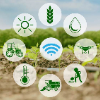With the global population increasing and arable land resources becoming increasingly limited, smart and precision agriculture have emerged as essential directions for sustainable agricultural development. Artificial intelligence (AI), particularly deep learning models, has been widely adopted in applications such as crop monitoring, pest detection, and yield prediction. Among recent generative models, diffusion models have demonstrated considerable potential in agricultural image processing, data augmentation, and remote sensing analysis. Compared to traditional generative adversarial networks (GANs), diffusion models exhibit greater training stability and superior image generation quality, effectively addressing challenges such as limited annotated datasets and imbalanced sample distributions in agricultural scenarios. This paper reviews recent advancements in the application of diffusion models within agriculture, focusing on their roles in crop disease and pest detection, remote sensing image enhancement, crop growth prediction, and agricultural resource management. Empirical studies show that diffusion models significantly enhance the performance of downstream models by improving accuracy, robustness, and generalization in tasks involving image synthesis, augmentation, and denoising under complex environmental conditions. Despite ongoing challenges in computational efficiency and domain generalization, diffusion models are expected to play an increasingly important role in the future of intelligent agriculture. As the technology continues to evolve, it holds substantial promise for addressing pressing global issues in food security and environmental sustainability.
翻译:暂无翻译





